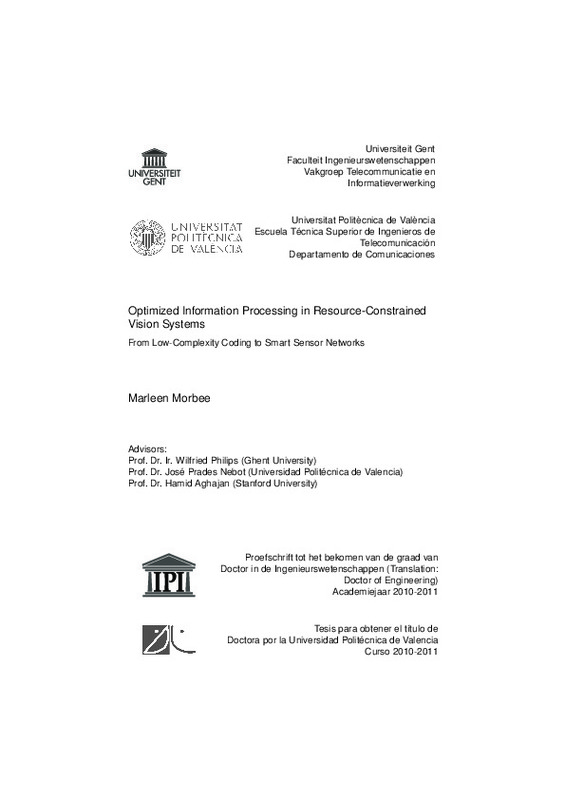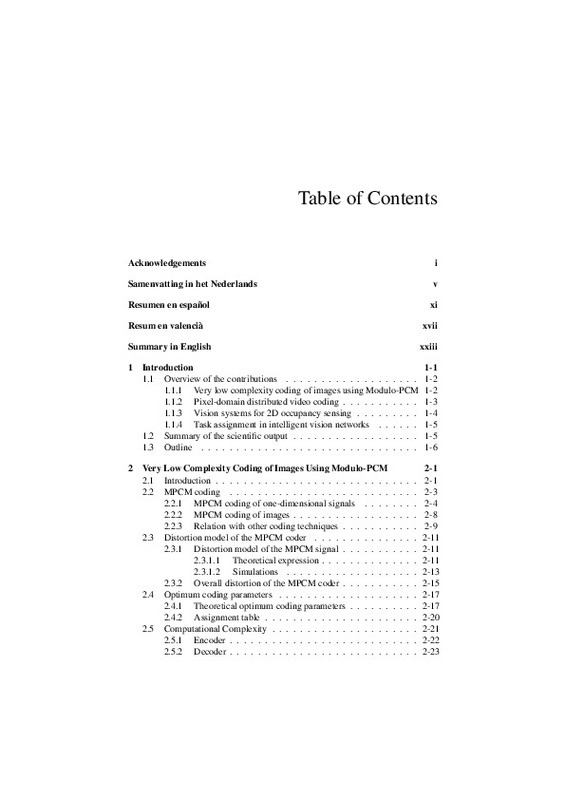- RiuNet repositorio UPV
- :
- Investigación
- :
- Tesis doctorales
- :
- Ver ítem
JavaScript is disabled for your browser. Some features of this site may not work without it.
Buscar en RiuNet
Listar
Mi cuenta
Estadísticas
Ayuda RiuNet
Admin. UPV
Optimized information processing in resource-constrained vision systems. From low-complexity coding to smart sensor networks
Mostrar el registro sencillo del ítem
Ficheros en el ítem
| dc.contributor.advisor | Prades Nebot, José
|
es_ES |
| dc.contributor.advisor | Philips, Wilfried
|
es_ES |
| dc.contributor.advisor | Aghajan, Hamid
|
es_ES |
| dc.contributor.author | MORBEE, MARLEEN
|
es_ES |
| dc.date.accessioned | 2011-10-14T11:47:42Z | |
| dc.date.available | 2011-10-14T11:47:42Z | |
| dc.date.created | 2011-03-31T08:00:00Z | es_ES |
| dc.date.issued | 2011-10-14T11:47:39Z | es_ES |
| dc.identifier.uri | http://hdl.handle.net/10251/12126 | |
| dc.description.abstract | Vision systems have become ubiquitous. They are used for traffic monitoring, elderly care, video conferencing, virtual reality, surveillance, smart rooms, home automation, sport games analysis, industrial safety, medical care etc. In most vision systems, the data coming from the visual sensor(s) is processed before transmission in order to save communication bandwidth or achieve higher frame rates. The type of data processing needs to be chosen carefully depending on the targeted application, and taking into account the available memory, computational power, energy resources and bandwidth constraints. In this dissertation, we investigate how a vision system should be built under practical constraints. First, this system should be intelligent, such that the right data is extracted from the video source. Second, when processing video data this intelligent vision system should know its own practical limitations, and should try to achieve the best possible output result that lies within its capabilities. We study and improve a wide range of vision systems for a variety of applications, which go together with different types of constraints. First, we present a modulo-PCM-based coding algorithm for applications that demand very low complexity coding and need to preserve some of the advantageous properties of PCM coding (direct processing, random access, rate scalability). Our modulo-PCM coding scheme combines three well-known, simple, source coding strategies: PCM, binning, and interpolative coding. The encoder first analyzes the signal statistics in a very simple way. Then, based on these signal statistics, the encoder simply discards a number of bits of each image sample. The modulo-PCM decoder recovers the removed bits of each sample by using its received bits and side information which is generated by interpolating previous decoded signals. Our algorithm is especially appropriate for image coding. | es_ES |
| dc.language | Inglés | es_ES |
| dc.publisher | Universitat Politècnica de València | es_ES |
| dc.rights | Reserva de todos los derechos | es_ES |
| dc.source | Riunet | es_ES |
| dc.subject | Vision systems | es_ES |
| dc.subject | Distributed video coding | es_ES |
| dc.subject | Sensor networks | es_ES |
| dc.subject | Smart cameras | es_ES |
| dc.subject | Occupancy sensing | es_ES |
| dc.subject | Resource-constrained systems | es_ES |
| dc.subject | Computer vision | es_ES |
| dc.subject | Task assignment | es_ES |
| dc.subject | Camera selection | es_ES |
| dc.subject | Image and video processing | es_ES |
| dc.subject | Image and video compression | es_ES |
| dc.subject | Wyner-ziv coding | es_ES |
| dc.subject | Low-complexity | es_ES |
| dc.subject | Line sensors | es_ES |
| dc.subject | Information processing | es_ES |
| dc.subject.classification | TEORIA DE LA SEÑAL Y COMUNICACIONES | es_ES |
| dc.title | Optimized information processing in resource-constrained vision systems. From low-complexity coding to smart sensor networks | |
| dc.type | Tesis doctoral | es_ES |
| dc.identifier.doi | 10.4995/Thesis/10251/12126 | es_ES |
| dc.rights.accessRights | Abierto | es_ES |
| dc.contributor.affiliation | Universitat Politècnica de València. Departamento de Comunicaciones - Departament de Comunicacions | es_ES |
| dc.description.bibliographicCitation | Morbee, M. (2011). Optimized information processing in resource-constrained vision systems. From low-complexity coding to smart sensor networks [Tesis doctoral]. Universitat Politècnica de València. https://doi.org/10.4995/Thesis/10251/12126 | es_ES |
| dc.description.accrualMethod | Palancia | es_ES |
| dc.type.version | info:eu-repo/semantics/acceptedVersion | es_ES |
| dc.relation.tesis | 3515 | es_ES |
Este ítem aparece en la(s) siguiente(s) colección(ones)
-
Tesis doctorales [5389]







![Text file [Text]](/themes/UPV/images/text.png)


